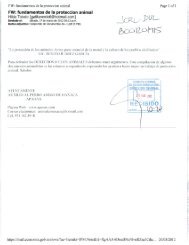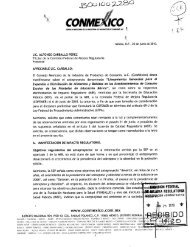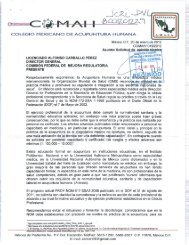Untitled
Untitled
Untitled
You also want an ePaper? Increase the reach of your titles
YUMPU automatically turns print PDFs into web optimized ePapers that Google loves.
S76<br />
relation to weight change or the incidence of obesity. We<br />
will discuss these methodological limitations separately for<br />
observational and experimental studies.<br />
Observational studies. In these studies, individuals typically<br />
report their food intakes by interviews or questionnaires, and<br />
the obtained estimates are related to their body mass index<br />
(BMI) or change in body weight. There are several methodological<br />
issues that make results from observational studies<br />
of diet and body weight difficult to interpret. First, the<br />
possibility of an effect of perceived body weight or changes<br />
in body weight on dietary habits (‘reverse causation’) should<br />
be considered. In contrast to various other health outcomes,<br />
people tend to be highly aware of their body weight and<br />
changes therein. In addition, many people hold strong<br />
beliefs about the relation between the composition of the<br />
diet and body weight and have control over two of the main<br />
determinants of body weight: energy intake and energy<br />
expenditure through physical activity. Cross-sectional studies<br />
where diet and measures of obesity are assessed<br />
simultaneously are therefore difficult to interpret: the<br />
perception that their body weight is high or increasing<br />
may lead persons to change their dietary habits (for example,<br />
dieting). For this reason, prospective observational studies<br />
relating dietary intakes to changes in body weight would be<br />
preferable. However, because changes in energy balance are<br />
likely to almost directly translate into changes in body<br />
weight, it seems biologically most relevant to study changes<br />
in dietary intakes in relation to changes in body weight over<br />
the same period. Because the exposure is not assessed before<br />
the outcome, such an analysis is not truly prospective and<br />
associations may still reflect an effect of perceived changes in<br />
body weight on changes in dietary habits over the same<br />
period.<br />
Second, selective underreporting of dietary intakes can be<br />
correlated with the degree of overweight (Heitmann and<br />
Lissner, 1995; Heerstrass et al., 1998). There are indications<br />
that intakes of carbohydrates and fat are more subject to<br />
underreporting than intakes of protein and this can bias<br />
results of studies of macronutrient composition and body<br />
weight.<br />
Third, dietary intakes and reporting thereof can be<br />
correlated to many other characteristics such as age, sex,<br />
socioeconomic status and other health-related habits that<br />
may affect energy balance (Braam et al., 1998). These<br />
characteristics can confound the association between dietary<br />
intakes and body weight. For example, individuals who are<br />
able to adhere to a generally recommended diet for weight<br />
management (for example, a low-fat diet) are also more<br />
likely to be able to adhere to limited total energy intake.<br />
Also, associations between (changes in) dietary intakes and<br />
energy balance have to be interpreted in the context of<br />
(changes in) energy expenditure. The latter is notoriously<br />
difficult to assess and is also subject to reporting bias. These<br />
methodological issues complicate the interpretation of data<br />
European Journal of Clinical Nutrition<br />
Carbohydrate intake and obesity<br />
RM van Dam and JC Seidell<br />
on macronutrient intakes and changes therein in relation to<br />
adiposity in observational studies.<br />
Experimental studies. In evidence-based medicine, a stronger<br />
weight is generally given to long-term randomized experimental<br />
studies than to observational studies. In the last<br />
several decades, many disputes have been published on the<br />
interpretation of experimental studies that have manipulated<br />
macronutrient composition of diets and evaluated<br />
changes in body weight. The same data can be interpreted in<br />
different ways. Some authors have argued that an increasing<br />
proportion of energy coming from fat leads to greater weight<br />
gain (Bray et al., 2004b), whereas others have concluded that<br />
the proportion of energy from fat does not substantially<br />
influence body weight (Willett, 2002). An important issue<br />
here is that the outcomes of experimental studies seem to<br />
be dependent on the choice of subjects (for example,<br />
overweight versus normal weight subjects), the duration of<br />
the experiment (short-term trials of days or weeks versus<br />
trials that last several years) and the choice of foods that have<br />
been used to manipulate macronutrient composition. With<br />
respect to the latter issue, a low-fat, high-carbohydrate diet<br />
can be a diet consisting mainly of highly refined grains and<br />
products with added sugar, or a diet that is close to being a<br />
traditional vegetarian diet (that is, with plenty of whole<br />
grains, legumes, fruits and vegetables). In addition, the effect<br />
of macronutrients on satiety and energy expenditure may<br />
depend on the way diets are administered. Energy intake is<br />
the outcome of the portion size energy density frequency<br />
of consumption, and all the three factors can be altered<br />
experimentally in relation to macronutrient composition.<br />
Furthermore, experimental studies in humans rely on the<br />
degree of successful (preferably double blinded) randomization<br />
and on the compliance of subjects with dietary<br />
regimens. Because both issues are problematic for long-term<br />
trials of macronutrient intakes and weight change, the<br />
strength of the evidence provided by randomized controlled<br />
trials can be limited. Finally, experimental studies can be<br />
performed by changing macronutrient intake with fixed or<br />
ad libitum energy intakes and only the latter will provide us<br />
with insights that are directly relevant for public health.<br />
Effects of dietary intakes in the context of weight management<br />
in obese persons may be different from the effects on<br />
prevention of weight gain in leaner persons. The transition<br />
from normal weight to obesity can result in changes in the<br />
levels of hormones such as insulin, leptin and adiponectin,<br />
which may alter relative substrate oxidation (fat versus<br />
carbohydrates) and appetite control (Blaak, 2004; Schwartz<br />
and Porte, 2005). In addition, the obese state alters basal and<br />
24-h energy requirements as well as the sensitivity to various<br />
hormones such as insulin and leptin. One should therefore<br />
be cautious in the extrapolation of findings from experimental<br />
studies on macronutrient composition and weight<br />
loss in obese persons, to the role of macronutrients in the<br />
prevention of weight gain.
















